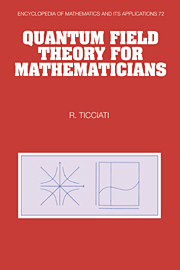Book contents
- Frontmatter
- Contents
- Preface
- Introduction
- 1 Relativistic Quantum Mechanics
- 2 Fock Space, the Scalar Field, and Canonical Quantization
- 3 Symmetries and Conservation Laws
- 4 From Dyson's Formula to Feynman Rules
- 5 Differential Transition Probabilities and Predictions
- 6 Representations of the Lorentz Group
- 7 Two-Component Spinor Fields
- 8 Four-Component Spinor Fields
- 9 Vector Fields and Gauge Invariance
- 10 Reformulating Scattering Theory
- 11 Functional Integral Quantization
- 12 Quantization of Gauge Theories
- 13 Anomalies and Vacua in Gauge Theories
- 14 SU(3) Representation Theory
- 15 The Structure of the Standard Model
- 16 Hadrons, Flavor Symmetry, and Nucleon-Pion Interactions
- 17 Tree-Level Applications of the Standard Model
- 18 Regularization and Renormalization
- 19 Renormalization of QED: Three Primitive Divergences
- 20 Renormalization and Preservation of Symmetries
- 21 The Renormalization Group Equations
- Appendix
- References
- Index
10 - Reformulating Scattering Theory
Published online by Cambridge University Press: 31 October 2009
- Frontmatter
- Contents
- Preface
- Introduction
- 1 Relativistic Quantum Mechanics
- 2 Fock Space, the Scalar Field, and Canonical Quantization
- 3 Symmetries and Conservation Laws
- 4 From Dyson's Formula to Feynman Rules
- 5 Differential Transition Probabilities and Predictions
- 6 Representations of the Lorentz Group
- 7 Two-Component Spinor Fields
- 8 Four-Component Spinor Fields
- 9 Vector Fields and Gauge Invariance
- 10 Reformulating Scattering Theory
- 11 Functional Integral Quantization
- 12 Quantization of Gauge Theories
- 13 Anomalies and Vacua in Gauge Theories
- 14 SU(3) Representation Theory
- 15 The Structure of the Standard Model
- 16 Hadrons, Flavor Symmetry, and Nucleon-Pion Interactions
- 17 Tree-Level Applications of the Standard Model
- 18 Regularization and Renormalization
- 19 Renormalization of QED: Three Primitive Divergences
- 20 Renormalization and Preservation of Symmetries
- 21 The Renormalization Group Equations
- Appendix
- References
- Index
Summary
Developing a new scattering theory from a foundation in the Green functions of the interacting field in order to provide a basis for renormalization, unstable particle theory, and in the next chapter, functional integral quantization.
Introduction
Chapters 10 to 13 constitute the third part of this text. Where Chapter 4 offered perturbative canonical quantization and scattering theory based on the free field, these chapters offer functional calculus quantization and scattering theory based on the interacting field. This change in viewpoint enables us to quantize the Standard Model of the electroweak and strong interactions.
At this point, our scattering theory still depends on the concept of an adiabatic turning on and off of the interactions. This concept served to connect interacting fields to free fields and to identify particles in incoming and outgoing states. However, when we formulate scattering theory in this way, it is impossible to include unstable particles and bound states in the theory. (We have computed decay amplitudes at tree level and found them sensible; it is in the annihilation scattering diagram that the possibility of decay makes even the tree level computation meaningless — see Remark 5.5.9.) Furthermore, gauge symmetries are broken by turning off the interactions.
- Type
- Chapter
- Information
- Quantum Field Theory for Mathematicians , pp. 269 - 327Publisher: Cambridge University PressPrint publication year: 1999



